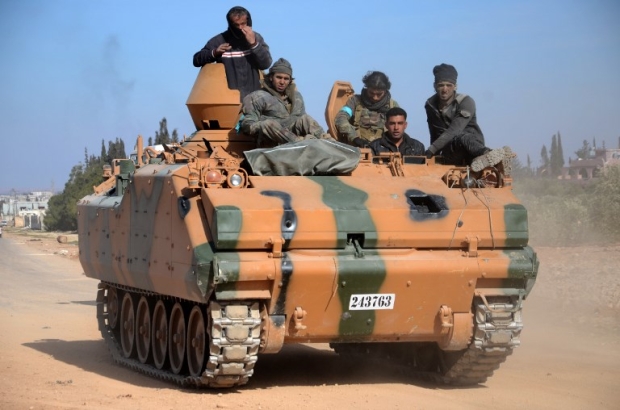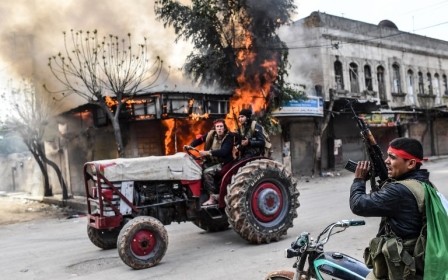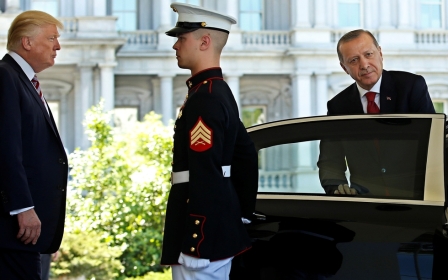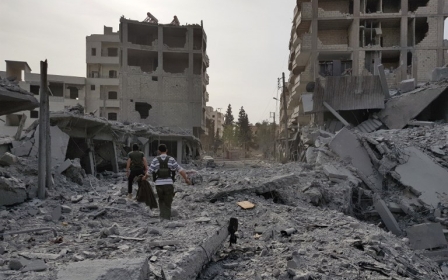Turkey's Afrin victory could reshape the Syria conflict
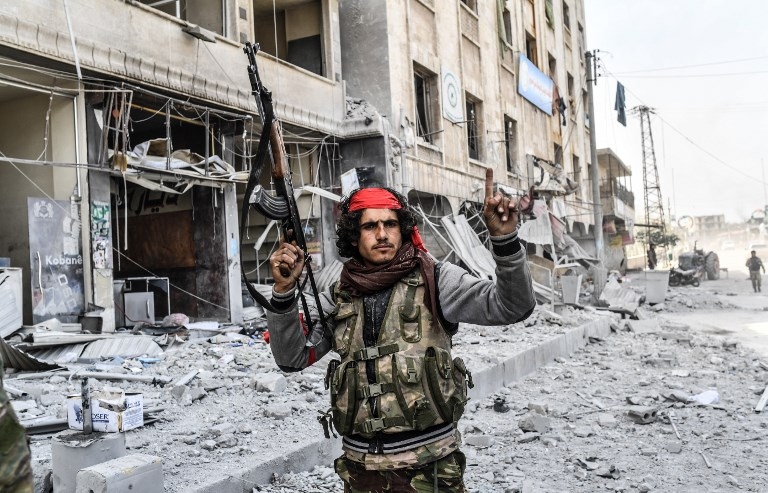
Among Syria’s neighbouring countries, Turkey is in a unique position to intervene.
For Iraq - which has lost millions of people since the 1970s, lived one of the longest wars of the 20th century with Iran, suffered under the heaviest embargo in modern times, and was twice occupied - Syria is neither an existential crisis nor a top priority.
As Iraq's own sectarian crisis has spiralled into warfare, and with millions of Iraqis living as refugees, the Syrian civil war has only a minor impact on Iraq's instability.
Lebanon, another of Syria's neighbours, has been deeply affected by the Syrian crisis, but it, too, has experienced similar suffering of its own. Lebanon was gripped by sectarian and religious civil war for years, and was devastated by the Israeli occupation and attacks.
Thirteen years ago, the Syrian regime withdrew its troops from Lebanon; ironically, in return, Lebanon sent Hezbollah to President Bashar al-Assad as a saviour army. The Syrian crisis is not presenting an unknown danger for strife-torn Lebanon.
'Comfortable enmity'
For Israel, which believes that Iran poses a threat via proxy actors in Syria, the situation is also familiar. For years, a similar equation existed in Lebanon. Israel’s relations with Syria have long been described as "comfortable enmity", and it seeks to keep that "comfort" while ensuring Iran's proxies are constrained to the point that they could not launch a large-scale war against Israel.
At the same time, Israel has used the Syrian crisis, and the ensuing turmoil that has gripped the region, to quietly deepen its occupation of the West Bank and Gaza.
At a certain point in the Syrian crisis, the PYD was acting as a sort of timeshare property; while the US occupied the largest room, other actors, including Assad, Iran and Russia were also using the PYD
Jordan, meanwhile, has continued to act as a “buffer zone”, as a refugee influx has poured across its border. This is not the first time Jordan has met such a challenge. It has been grappling with the Palestinian crisis for decades and became an important logistics centre in the struggle against the Islamic State (IS).
Among Syria's neighbours, Turkey, which is much larger and enjoys more economic and military power than the sum of all the others, has a unique historical experience. Although Turkey suffered severe democratisation pains in the past, its relations with Syrian President Bashar al-Assad have differed from those of its Arab neighbours.
Living with terrorism
Amid the massive humanitarian tragedy unfolding in Syria, Turkey has played a vital role, hosting 3.5 million Syrian refugees since 2011 - even as Turkey has endured its own wave of terrorism, with dozens of attacks launched by IS and the Kurdistan Workers' Party (PKK).
When IS attacked a wedding ceremony and killed innocent civilians, it was immediately reported by Western media; when the PKK did the same, it was largely ignored.
Turkey's latest offensive in Syria cannot be seen as a surprise or a bizarre move; on the contrary, Ankara has alerted all actors in Syria that it will not allow the PKK to control autonomous regions
As the attacks mounted, it would have been unthinkable for Turkey not to respond to these threats against its political and economic stability. And yet, other countries expected Turkey to live with terrorism, even as IS was transformed into an instrument that legitimised intervention in Syria.
In 2015, there was not an actor in Syria who was not supposedly fighting IS. From the Syrian opposition, to Hezbollah, to the PKK and its affiliated Democratic Union Party (PYD), to Iran-backed militias, to Russia, to the US, everyone claimed to be fighting IS.
Yet even as Turkey was besieged by terrorism from the PKK and IS, Ankara's calls for land operations against IS were disregarded. Turkey ultimately launched Operation Euphrates Shield to clear its border area of armed fighters; each step in the process was transparent and announced to the world.
Thus, Turkey's latest offensive in Syria cannot be seen as a surprise or a bizarre move; on the contrary, Ankara has alerted all actors in Syria that it will not allow the PKK to control autonomous regions.
A grave strategic mistake
Euphrates Shield elicited complex reactions from other actors involved militarily in Syria, particularly the US. Many countries were trying to manage the Syrian crisis via proxy actors - in particular, the PKK, using its fancy name the Syrian Democratic Forces (SDF).
At a certain point in the Syrian crisis, the PYD was acting as a sort of timeshare property; while the US occupied the largest room, other actors, including Assad, Iran and Russia were also using the PYD.
This was unsustainable chaos. When the group sent a suicide bomber to cross the Turkish border, they were called PKK; upon returning to Syria, they were called PYD. When fighting against Turkey, they were called PKK; when fighting IS, they were called SDF.
When they attacked in collaboration with Assad's forces, they were called Syrian soldiers; when they attacked non-PKK Kurdish groups, they were called the only secular force in the Middle East.
But one thing has never changed: whoever fights against them is seen to be "attacking Kurds". In the middle of this mess, the US transformed its partnership with the constantly reincarnated PKK from a temporary one, to one that is suspiciously strategic. This was a grave strategic mistake, enabled by the current chaos in Washington’s security and foreign policy establishment.
It was madness, if not an impossible mission, to form a liquid alliance with the Marxist-Leninist group, listed by the US as a terrorist organisation. Their indefensible alliance not only poisoned Turkey-US relations, but showed that Washington has no sense of geopolitical, regional or traditional alliances, and any tool is legitimate when fighting IS.
Where the US can go from here depends on the outcome of its decision to reduce its entire Syrian strategy into a PYD partnership.
Marginalising the PKK
Over the past three years, Ankara has highlighted this unsustainable situation multiple times. After the expected defeat of IS, Turkey announced that it would intervene against the PKK/PYD and would not allow self-claimed autonomous regions. The Afrin operation was completed in two months and the PYD removed from the region.
Afrin was not like Raqqa. Thousands of civilians did not lose their lives, there was no indiscriminate bombing or humanitarian tragedy, and hundreds of thousands of people did not become refugees. The fact that Afrin has not become Raqqa is, in itself, a success.
After the Afrin defeat, the PKK is more marginalised. As with IS, Syrians and Kurds will continue to question the legitimacy of the PYD, an armed group that includes foreign radical leftist fighters from Germany to England, and France to the US. Washington will also encounter difficulties in maintaining its fluid alliance with the marginalised PYD.
Drawing a roadmap
The US has reached the limits of using a terrorist network against another terrorist network. This is an oxymoronic political strategy without an exit. It is a typical tragedy in the proxy world: from Afghanistan to Syria, the use of a proxy is not the crucial matter - rather, the critical question is what you do with them after the mission is accomplished.
The recent visit to Ankara by former US Secretary of State Rex Tillerson breathed new life into Turkey-US relations. The meeting between Tillerson and Turkish President Recep Tayyip Erdogan offered an opportunity to sincerely discuss the issues at hand and convey expectations for a solution.
Since then, however, Tillerson has been fired and the Turkish-backed Free Syrian Army (FSA) entered Afrin city centre. Upcoming meetings on the Syrian file in Washington will start in the wake of these new developments.
The complete removal of the PYD from the Turkish border should be grounds for Turkish-American cooperation going forward, and the US is giving positive signals in this regard
It is unlikely that the US will start from scratch on the Syria dossier with a completely new security and foreign policy team in Washington. The complete removal of the PYD from the Turkish border should be grounds for Turkish-American cooperation going forward, and the US is giving positive signals in this regard. From this synergy, a possible roadmap could be derived, including stable non-conflict zones.
Both the US and Turkey should use Afrin as an opportunity to leverage Turkish military involvement in Syria against the chaos offered by Damascus and its blind supporters.
- Taha Ozhan is a member of the Turkish parliament and a former chairman of its foreign affairs committee. He is an academic and writer and holds a PhD in politics and international relations. He frequently comments and writes for international media. His latest book is Turkey and the crisis of Sykes-Picot Order (2015).
The views expressed in this article belong to the author and do not necessarily reflect the editorial policy of Middle East Eye.
Photo: A Turkish-backed Syrian rebel gestures in the city of Afrin in northern Syria on 18 March 2018, as Turkish forces and their rebel allies took control of the Kurdish-majority city (AFP)
New MEE newsletter: Jerusalem Dispatch
Sign up to get the latest insights and analysis on Israel-Palestine, alongside Turkey Unpacked and other MEE newsletters
Middle East Eye delivers independent and unrivalled coverage and analysis of the Middle East, North Africa and beyond. To learn more about republishing this content and the associated fees, please fill out this form. More about MEE can be found here.



